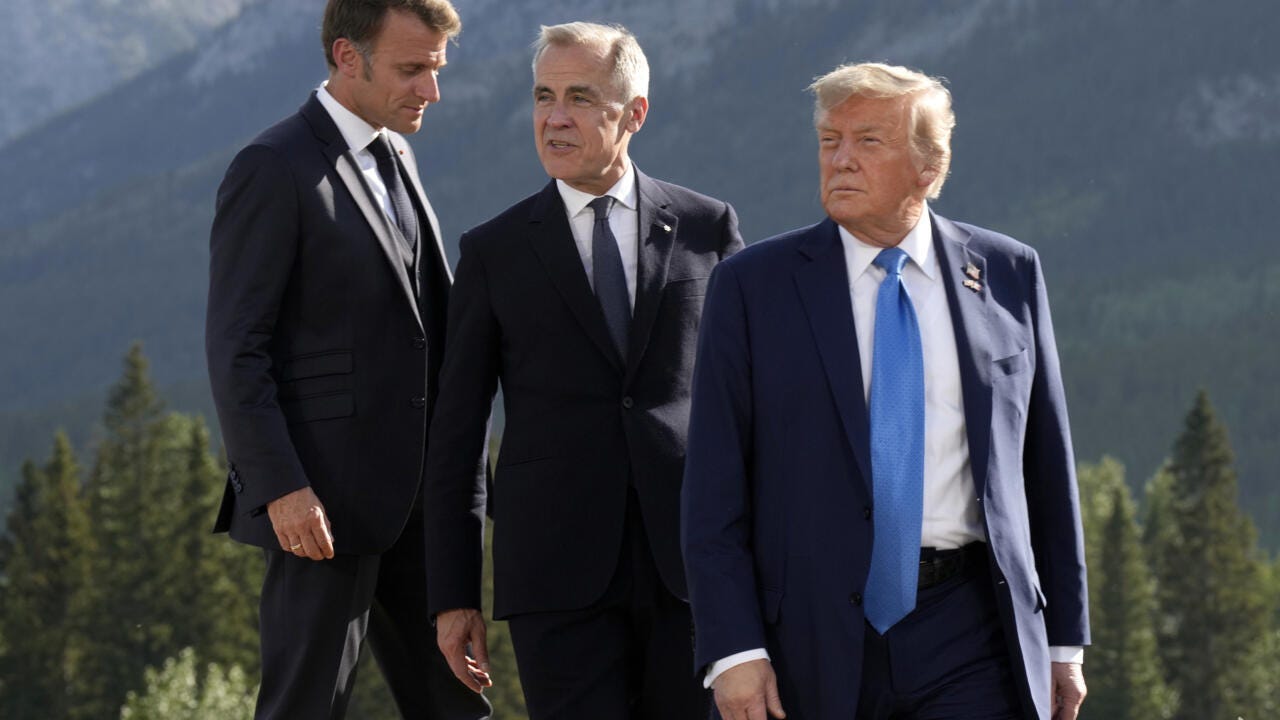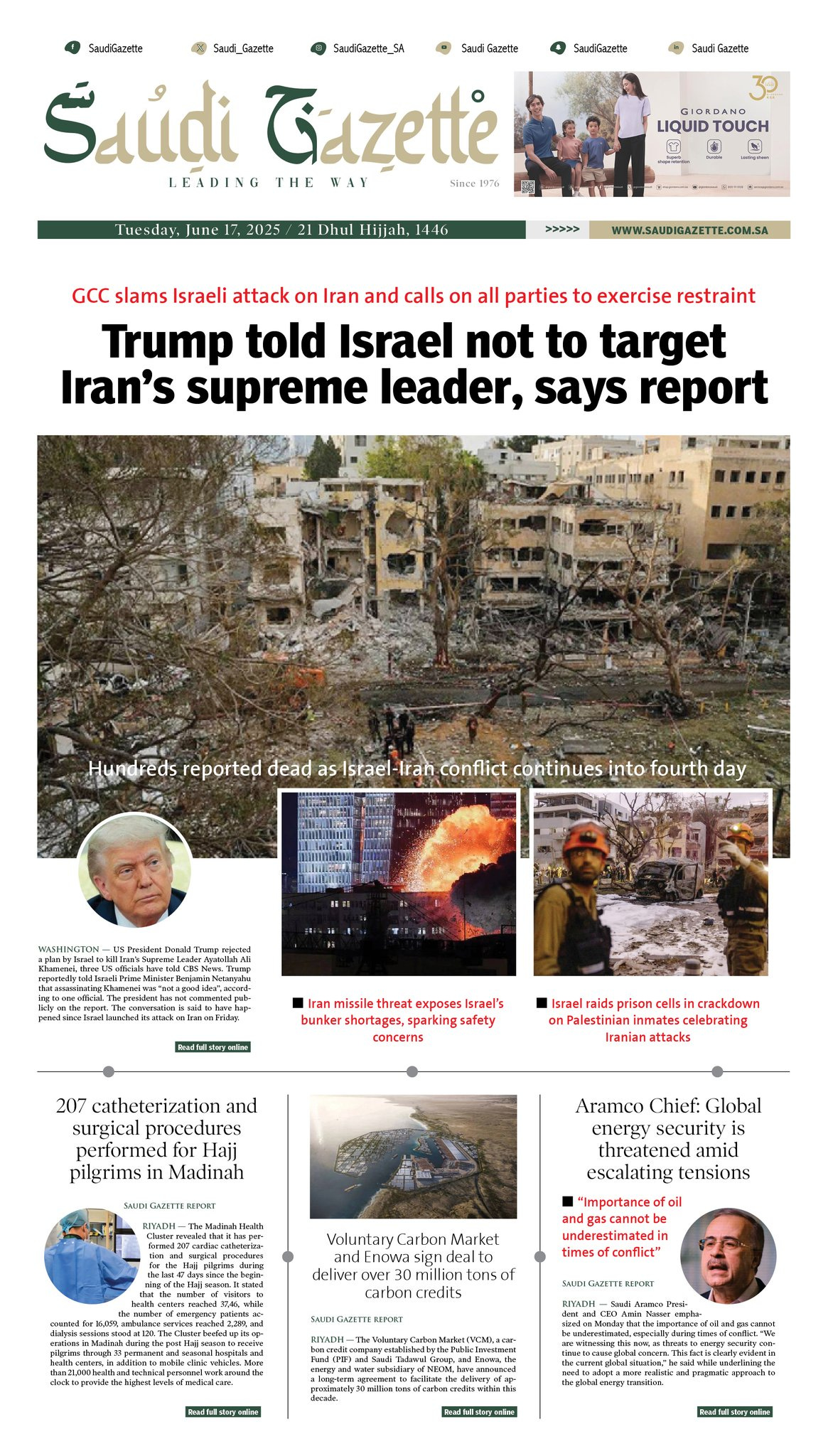G7 Fractured Amid Escalating Iran-Israel Conflict and Trump's Abrupt Exit
As world leaders scramble to contain multiple crises — from Russia’s war on Ukraine to a volatile Middle East — Trump’s early departure from the Canada summit leaves allies in disarray
Six of the Group of Seven leaders are trying on the final day of their summit Tuesday to show the wealthy nations’ club still has the clout to shape world events despite the early departure of U.S. President Donald Trump. Canadian Prime Minister Mark Carney and his counterparts from the U.K., France, Germany, Italy and Japan will be joined by Ukrainian President Volodymyr Zelenskyy and NATO chief Mark Rutte to discuss Russia’s relentless war on its neighbor. World leaders had gathered in Canada with the specific goal of helping to defuse a series of pressure points, only to be disrupted by a showdown over Iran’s nuclear program that could escalate in dangerous and uncontrollable ways. Israel launched an aerial bombardment campaign against Iran on Friday, and Iran has hit back with missiles and drones. Trump departed a day early from the summit in the Canadian Rocky Mountain resort of Kananaskis, leaving late Monday and saying: “I have to be back, very important.” As conflict between Israel and Iran intensified, he declared that Tehran should be evacuated “immediately” — while also expressing optimism about a deal to stop the violence. Before leaving, Trump joined the other leaders in issuing a statement saying Iran “can never have a nuclear weapon” and calling for a “de-escalation of hostilities in the Middle East, including a ceasefire in Gaza.” Getting unanimity — even on a short and broadly worded statement — was a modest measure of success for the group. At the summit, Trump warned that Tehran must curb its nuclear program before it’s “too late.” He said Iranian leaders would “like to talk” but they had already had 60 days to reach an agreement on their nuclear ambitions and failed to do so before the Israeli aerial assault began. “They have to make a deal,” he said. Asked what it would take for the U.S. to get involved in the conflict militarily, Trump said Monday morning, “I don’t want to talk about that.” - AP
Russia unleashed a massive missile and drone attack on Kyiv and other Ukrainian cities overnight, killing at least 15 people and wounding about 100 in the capital in one of the deadliest assaults since the start of the full-scale invasion in February 2022. At least one person was killed in Odesa. The attacks came as President Volodymyr Zelenskyy was preparing to meet on June 17 with US President Donald Trump and other leaders at a Group of Seven (G7) summit in Canada and call for tougher measures against Russia. But Trump left the summit before his meeting with Zelenskyy could take place, returning to Washington amid a deadly conflict between Israel and Iran. In Kyiv, an entire nine-story section of an apartment building was razed to the ground by a missile strike during the onslaught, which occurred as many residents were sleeping in their homes, and officials said the death toll could rise as rescuers searched through rubble. Adjacent windows were blown out and hunks of debris littered the street. Russia fired at least 175 drones, 14 guided missiles, and two ballistic missiles at the capital and the surrounding area, the city military administration reported. At least 15 people were killed and 139 wounded in Kyiv, Interior Minister Ihor Klymenko said on television. A 62-year-old US citizen was among the dead in the capital, Mayor Vitali Klitschko said on Telegram. The body of a 60-year-old woman was found in the ruins of a building in Odesa, authorities said, and Russia also fired drones and missiles at the southeastern city of Zaporizhzhya, closer to the front in a region that Russian forces are attempting to push into on the ground. Russia launched more than 440 drones and 32 missiles in the attack overnight into June 17, which also targeted the Chernihiv, Zhytomyr, Kirovohrad, and Mykolayiv regions - RFE/RL
Watch my wrap-up of Day One of the G7 Summit in Canada as the current occupant of the White House abruptly departs after the first day…
The European Union will soon have new powers to gradually restrict and ultimately ban the flow of Russian gas across the continent within the next three years as part of an unprecedented push against reliance on Moscow. A draft document, seen by POLITICO ahead of its publication, pledges to remove "the Union's exposure to the significant risks for trade and security, resulting from gas trade with the Russian Federation by laying down a stepwise prohibition of imports of natural gas," and to “introduce rules to effectively implement and monitor that prohibition." From Jan. 1, 2026, the import of natural gas via pipelines or as seaborne liquefied natural gas will be prohibited, except in specific circumstances, which would include short-term contracts struck prior to June 17, 2026. Exceptions are also built into the text for landlocked countries that have struck long-term agreements with Moscow. The terms of the text also leave open the possibility that some European firms could continue importing Russian gas under long-term contracts until Jan. 1, 2028. In an unprecedented move, gas that arrives in the EU via Russia, such as through interconnection points through Serbia, will be considered Russian gas unless it has clear documentation demonstrating it has originated elsewhere. Countries will also have to publish new "diversification plans" showing how they will end reliance on both Russian oil and gas - Politico
China wrapped up its latest engagement effort in Central Asia on Tuesday with a 1.5 billion (US$209 million) yuan pledge towards livelihood and development projects in the region. The six participating countries in the second China-Central Asia Summit also signed a landmark permanent friendship pact. “China is willing to provide 1.5 billion yuan in grant assistance to Central Asian countries this year to support livelihood and development projects of common concern to each country,” Chinese President Xi Jinping said in his keynote address to the summit in Kazakhstan’s capital Astana. “Additionally, China will offer 3,000 training opportunities to Central Asian nations over the next two years.” Xi hailed the signing of the Treaty of Permanent Good-Neighbourliness and Friendly Cooperation as a milestone in relations among the six nations, saying it represented “an innovative endeavour in China’s neighbourhood diplomacy – a contribution for our time that benefits generations to come”. China has similar treaties with Russia and Pakistan. Xi also stressed the need for cooperation in a world “entering a new period of upheaval and transformation”. - SCMP
Today several trials of political prisoners took place in Tbilisi City Court. Zurab Japaridze, an elected member of Parliament, refused to appear in court, saying he refused to take part in a charade. Observers say this is a clear indication of where Georgia is headed, towards a one rule where Moscow calls the shots. “It’s even worse than Russia - it’s more like North Korea,” said his brother Gia Japaridze, professor at the University of Georgia, elected member of the Parliament of Georgia. Tomorrow, Giorgi Vashadze, another leader of Georgian opposition will have the trial with the same accusations. Separately, in a isolated court room, Giorgi Akhobadze, a famous doctor, who had been allegedly planted with drugs, faces a many years sentence.






